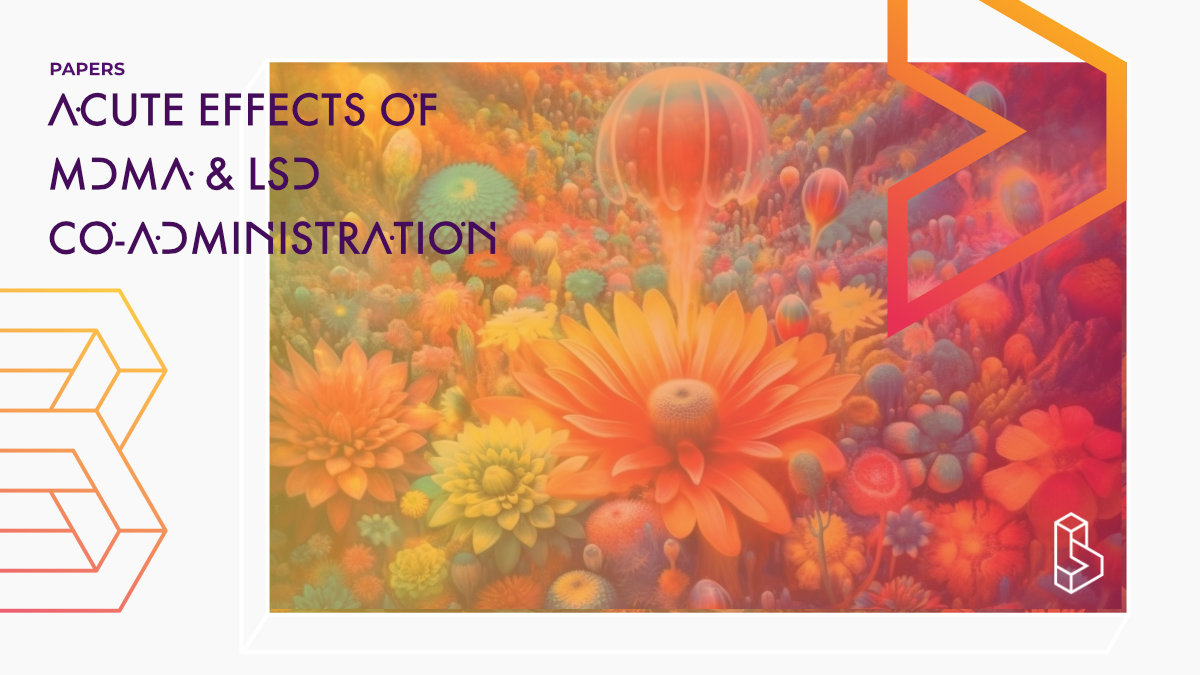This double-blind, randomized, placebo-controlled, crossover study (n=24) investigates the co-administration of MDMA (100mg) and LSD (100µg) compared to their individual use and placebo. Findings reveal that while the combination doesn’t enhance the quality of subjective effects compared to LSD alone, it prolongs these effects, elevates plasma concentrations of LSD, and extends LSD’s plasma elimination half-life. However, the combination also increases blood pressure, heart rate, and pupil size more than LSD alone. It does not improve the safety profile of LSD, indicating that combining MDMA and LSD may not offer substantial benefits over LSD alone in psychedelic-assisted therapy.
Abstract of Acute effects of MDMA and LSD co-administration in a double-blind placebo-controlled study in healthy participants
“There is renewed interest in the use of lysergic acid diethylamide (LSD) in psychiatric research and practice. Although acute subjective effects of LSD are mostly positive, negative subjective effects, including anxiety, may occur. The induction of overall positive acute subjective effects is desired in psychedelic-assisted therapy because positive acute experiences are associated with greater therapeutic long-term benefits. 3,4-Methylenedioxymethamphetamine (MDMA) produces marked positive subjective effects and is used recreationally with LSD, known as “candyflipping.” The present study investigated whether the co-administration of MDMA can be used to augment acute subjective effects of LSD. We used a double-blind, randomized, placebo-controlled, crossover design with 24 healthy subjects (12 women, 12 men) to compare the co-administration of MDMA (100 mg) and LSD (100 µg) with MDMA and LSD administration alone and placebo. Outcome measures included subjective, autonomic, and endocrine effects and pharmacokinetics. MDMA co-administration with LSD did not change the quality of acute subjective effects compared with LSD alone. However, acute subjective effects lasted longer after LSD + MDMA co-administration compared with LSD and MDMA alone, consistent with higher plasma concentrations of LSD (Cmax and area under the curve) and a longer plasma elimination half-life of LSD when MDMA was co-administered. The LSD + MDMA combination increased blood pressure, heart rate, and pupil size more than LSD alone. Both MDMA alone and the LSD + MDMA combination increased oxytocin levels more than LSD alone. Overall, the co-administration of MDMA (100 mg) did not improve acute effects or the safety profile of LSD (100 µg). The combined use of MDMA and LSD is unlikely to provide relevant benefits over LSD alone in psychedelic-assisted therapy.”
Authors: Isabelle Straumann, Laura Ley, Friederike Holze, Anna M. Becker, Aaron Klaiber, Kathrin Wey, Urs Duthaler, Nimmy Varghese, Anne Eckert & Matthias E. Liechti
Summary of Acute effects of MDMA and LSD co-administration in a double-blind placebo-controlled study in healthy participants
LSD is a classic serotonergic psychedelic that produces mostly positive experiences of alterations of consciousness, but may also produce negative subjective effects, including acute anxiety. Positive experiences are associated with more favourable long-term therapeutic improvements in patients in psychedelic-assisted therapy.
MDMA induces positive subjective effects, including well-being, empathy, trust, and closeness to others. The combined administration of MDMA and LSD induces synergistic acute positive mood effects, including more positive mood and less anxiety than LSD administration alone.
Find this paper
https://doi.org/10.1038/s41386-023-01609-0
Open Access | Google Scholar | Backup | 🕊
Cite this paper (APA)
Straumann, I., Ley, L., Holze, F., Becker, A. M., Klaiber, A., Wey, K., ... & Liechti, M. E. (2023). Acute effects of MDMA and LSD co-administration in a double-blind placebo-controlled study in healthy participants. Neuropsychopharmacology, 1-9.
Study details
Compounds studied
MDMA
LSD
Placebo
Topics studied
Healthy Subjects
Study characteristics
Original
Placebo-Controlled
Double-Blind
Within-Subject
Randomized
Participants
24
Humans
Authors
Authors associated with this publication with profiles on Blossom
Matthias LiechtiMatthias Emanuel Liechti is the research group leader at the Liechti Lab at the University of Basel.
Institutes
Institutes associated with this publication
University of BaselThe University of Basel Department of Biomedicine hosts the Liechti Lab research group, headed by Matthias Liechti.
Compound Details
The psychedelics given at which dose and how many times
LSD 100 μg | 2x MDMA 100 mg | 2xLinked Research Papers
Notable research papers that build on or are influenced by this paper
Oxytocin and the Role of Fluid Restriction in MDMA-Induced Hyponatremia: A Secondary Analysis of 4 Randomized Clinical TrialsThis reanalysis of four RCTs (n=96) finds that MDMA (100mg or 125mg) induced hyponatremia in 31% of participants, with none occurring in the fluid-restricted group (n=15) compared to 37% in the unrestricted group (n=81). The study challenges previous understanding by showing hyponatremia correlates with increased oxytocin (433% increase) rather than vasopressin levels, suggesting oxytocin mimics vasopressin's effects in the kidneys.
Linked Clinical Trial
Effects of MDMA Co-administration on the Response to LSD in Healthy SubjectsThis completed double-blind, placebo-controlled trial (n=24) aimed to investigate the effects of co-administering MDMA with LSD in healthy subjects. The study, conducted by the University Hospital in Basel, Switzerland, assessed the acute subjective and autonomic effects of LSD alone and in combination with MDMA.

